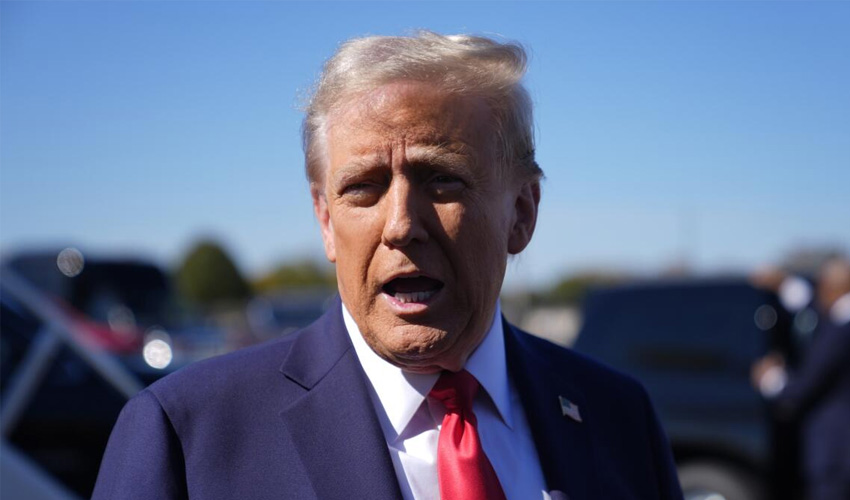Nadiah Alyafai, a 22-year-old with family ties to Yemen, is preparing for years of missed family gatherings, birthdays, and holidays. Since childhood, she has frequently visited her relatives in Yemen, while many of them, including those with legal US residency, have also travelled to the United States.
However, as US President Donald Trump considers imposing sweeping travel restrictions on citizens from over 40 countries, Alyafai fears her family members may soon be unable to visit. Additionally, she worries that her father, a US permanent resident for more than two decades, might face difficulties returning to Chicago if he leaves the country.
"If my grandparents pass away in Yemen and we can't see them one last time... there are no words. It's heartbreaking," Alyafai expressed.
A leaked draft of the Trump administration’s proposal suggests travel bans or limitations for numerous countries. While the White House has yet to confirm a final decision, the uncertainty has sparked fear among Muslim Americans.
Anxiety among Muslim communities
Advocacy groups report growing distress among Muslim Americans, especially following recent arrests of college students from Muslim-majority nations by US Immigration and Customs Enforcement (ICE).
"US citizens are now afraid to travel abroad, worried that the Trump administration might block their return, particularly if they visit Muslim countries," said Robert McCaw, government affairs director at the Council on American-Islamic Relations (CAIR).
Zahra Billoo, executive director of CAIR’s San Francisco Bay Area office, noted that some individuals have postponed important life events. One member, for example, delayed their wedding abroad due to fears of being denied reentry into the US.
Many affected individuals are hesitant to share their stories, fearing retribution from the government or online backlash.
Crackdown on student protesters raises concerns
Haris Tarin, vice president of the Muslim Public Affairs Council, described the current level of fear as unprecedented. He believes the recent arrests of student protesters have intensified concerns.
In March, Columbia University student Mahmoud Khalil was detained and threatened with deportation after participating in a protest over the war in Gaza. Similar actions were taken against Turkish national Rumeysa Ozturk at Tufts University and Iranian student Alireza Doroudi at the University of Alabama.
Secretary of State Marco Rubio announced on Thursday that over 300 student and visitor visas had been revoked since Trump took office in January. He stated that visas could be cancelled if students engaged in disruptive activities, such as vandalizing university property or harassing others. However, he did not specify whether the detained students' actions met this threshold.
Tarin warned that these measures could erode free speech rights. "This should be scary for every American. This is just the beginning, and no one is safe from having their freedom of speech impacted," he said.
Chilling effect on activism
Muslim advocacy groups worry that Trump’s immigration policies may deter people from speaking out. Dr. Mahmoud Al-Hadidi, chair of the Michigan Muslim Community Council, stated that many members feel their right to free speech is increasingly limited.
Despite the crackdown, some student protests have intensified. Zaid Yousef, president of the Muslim Student Association at the University of California, Berkeley, said recent demonstrations have seen larger turnouts.
"The protests we had two weeks ago had a much bigger turnout than before Trump took office," he said. However, he acknowledged that students on visas are exercising more caution.
The situation draws comparisons to Trump's earlier travel bans on Muslim-majority nations. While his 2017 bans faced legal challenges, one version was ultimately upheld by the Supreme Court in 2018. The latest proposed restrictions could be even broader, reportedly affecting non-Muslim countries like Cuba, Bhutan, and Haiti.
Tarin observed a key difference between 2017 and now: "When the Muslim ban was first introduced, there was widespread outrage across American civil society. Now, people seem exhausted."
Guidance for American Muslims travelling abroad
In response to growing concerns, CAIR has issued travel guidance for Muslim Americans. The organization warns that U.S. customs officials may ask returning travellers about their political views or social media activity.
“We are seeing an unprecedented level of ideological screening. Simply having negative opinions about the president could be enough to deny someone entry into the US,” McCaw cautioned.
The advisory suggests Muslim travellers take precautions, such as deleting unnecessary apps and sensitive content from their phones before crossing the border.
CAIR also urges US green card holders from affected countries to avoid international travel unless absolutely necessary. Those planning to travel are advised to consult an immigration attorney beforehand.
As the Trump administration moves forward with its new travel restrictions, Muslim Americans remain on edge, fearing a future where their ability to move freely -- and speak out -- could be further compromised.


























